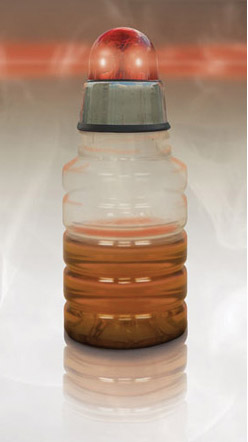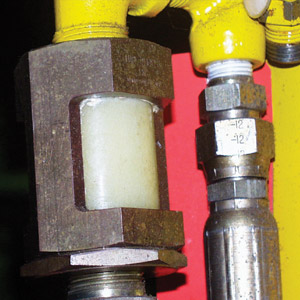Lube Tips: Slight Changes Can Mean Big Problems
 Copper readings can be particularly alarming when increases are in the hundreds of parts per million. However, huge increases are typically insignificant in terms of component wear. Ironically, small subtle increases in copper are of greater concern and should be examined closely. Copper alloy component wear is generally accompanied by lock-step increases in alloy metals such as lead, tin, aluminum and zinc. The amount of alloy metal present in brass/bronze components is only a small percentage of the total copper content. Changes in these alloys may be only a few parts per million but should be taken seriously when present with copper increases.
Copper readings can be particularly alarming when increases are in the hundreds of parts per million. However, huge increases are typically insignificant in terms of component wear. Ironically, small subtle increases in copper are of greater concern and should be examined closely. Copper alloy component wear is generally accompanied by lock-step increases in alloy metals such as lead, tin, aluminum and zinc. The amount of alloy metal present in brass/bronze components is only a small percentage of the total copper content. Changes in these alloys may be only a few parts per million but should be taken seriously when present with copper increases.
Controlling Contamination
Portable transfer/filter carts are versatile and can be used for more than just transferring fluids. Other possible uses include offline filtration, cleaning stored lubes, flushing after machine repair and rebuild, flushing during equipment commissioning and draining a reservoir or sump.
Greasing Gearbox Bearings
 Does your gearbox have a sealed or open input shaft bearing? This bearing is often above the gearbox oil level and must be greased if it is an open bearing. Manufacturers may ship the gearbox with a plug where the grease fitting is needed to prevent damage during shipping.
Does your gearbox have a sealed or open input shaft bearing? This bearing is often above the gearbox oil level and must be greased if it is an open bearing. Manufacturers may ship the gearbox with a plug where the grease fitting is needed to prevent damage during shipping.
In addition, the manufacturer may change the input shaft bearing design from open to sealed and back to open without notification. Small changes such as no longer receiving an attached plastic bag with a grease fitting included with the replacement gearbox may be a clue to a change in design.
Always check the manual included with the new gearbox to see if the lubrication needs have changed.
Advice for Coupling Grease Application
When changing the lubricating grease in a geared motor coupling, always apply a full coating of grease to the teeth of the coupling. Never fill the coupling housing completely with a grease gun due to expansion of the grease as the motor comes up to running temperature.
This expansion of the grease will apply internal coupling pressure, pushing the motor shaft off magnetic center and onto the thrust surface of your bearing, causing bearings to overheat and leading to early bearing failure.
Even after hand-packing the coupling, the motor should be run up to operating temperature, then shut down and the grease plug removed to allow excess grease and pressure to be released.
Inspect Your Level Gauges
Routinely inspect the vent hole in column-type vented level gauges. In dirty environments, the vent hole can become easily plugged, causing an air lock in the gauge headspace. This will result in a false oil level (higher than reality) in the gauge. Many prefer dual-port gauges instead (unvented).
‘Handy’ Sampling Tip
 During regular weekly or monthly oil sampling, use a tube of “handy wipes” to keep your hands cleaner while handling sample equipment. This practice may not show directly in the cleanliness of the samples, but it feels cleaner, looks very professional and sends a message about the importance of contamination control.
During regular weekly or monthly oil sampling, use a tube of “handy wipes” to keep your hands cleaner while handling sample equipment. This practice may not show directly in the cleanliness of the samples, but it feels cleaner, looks very professional and sends a message about the importance of contamination control.
Keeping Hydraulics Healthy
Baffles are an important component in a hydraulic reservoir. They allow the fluid time to cool, deaerate and to settle out water and dirt. A good rule of thumb for residence time in a reservoir is three to five times the pump output. If the system is highly contaminated, residence time may be 10 times the gallons per minute of the pump.
The “Lube Tips” section of Machinery Lubrication magazine features innovative ideas submitted by our readers. Additional tips can be found in our Lube-Tips e-mail newsletter. If you have a tip to share, e-mail it to us at editor@noria.com. To sign up for the Lube-Tips newsletter, visit www.machinerylubrication.com and click on the “Newsletters” link at the top.
